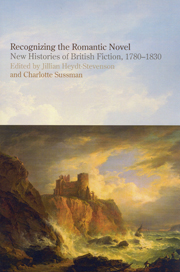Book contents
- Frontmatter
- Contents
- Acknowledgements
- Notes on Contributors
- Preface
- 1 ‘Launched Upon the Sea of Moral and Political Inquiry’: The Ethical Experiments of the Romantic Novel
- 2 Bad Marriages, Bad Novels: The ‘Philosophical Romance’
- 3 Enlightenment or Illumination: The Spectre of Conspiracy in Gothic Fictions of the 1790s
- 4 Burney's Conservatism: Masculine Value and ‘the Ingenuous Cecilia’
- 5 ‘All Agog to Find Her Out’: Compulsory Narration in The Wanderer
- 6 A Select Collection: Barbauld, Scott, and the Rise of the (Reprinted) Novel
- 7 Austen, Empire and Moral Virtue
- 8 Fanny Price's British Museum: Empire, Genre, and Memory in Mansfield Park
- 9 Between the Lines: Poetry, Persuasion, and the Feelings of the Past
- 10 Scholarly Revivals: Gothic Fiction, Secret History, and Hogg's Private Memoirs and Confessions of a Justified Sinner
- 11 Sympathy, Physiognomy, and Scottish Romantic Fiction
- Works Cited
- Index
1 - ‘Launched Upon the Sea of Moral and Political Inquiry’: The Ethical Experiments of the Romantic Novel
- Frontmatter
- Contents
- Acknowledgements
- Notes on Contributors
- Preface
- 1 ‘Launched Upon the Sea of Moral and Political Inquiry’: The Ethical Experiments of the Romantic Novel
- 2 Bad Marriages, Bad Novels: The ‘Philosophical Romance’
- 3 Enlightenment or Illumination: The Spectre of Conspiracy in Gothic Fictions of the 1790s
- 4 Burney's Conservatism: Masculine Value and ‘the Ingenuous Cecilia’
- 5 ‘All Agog to Find Her Out’: Compulsory Narration in The Wanderer
- 6 A Select Collection: Barbauld, Scott, and the Rise of the (Reprinted) Novel
- 7 Austen, Empire and Moral Virtue
- 8 Fanny Price's British Museum: Empire, Genre, and Memory in Mansfield Park
- 9 Between the Lines: Poetry, Persuasion, and the Feelings of the Past
- 10 Scholarly Revivals: Gothic Fiction, Secret History, and Hogg's Private Memoirs and Confessions of a Justified Sinner
- 11 Sympathy, Physiognomy, and Scottish Romantic Fiction
- Works Cited
- Index
Summary
Although it is less often remarked upon than the other revolutions of the Romantic era, an epoch-making event occurred in the British literary field at the end of the eighteenth century and the beginning of the nineteenth: the novel quantifiably became the dominant literary genre of the day. Peter Garside demonstrates that in the first three decades of the nineteenth century ‘out-put of fiction almost certainly overtook that of poetry, and the genre eventually gained new respectability’, triumphantly surpassing others. Garside, James Raven, and Rainer Schowerling have recorded entries for 1106 fiction titles between 1780 and 1799 and entries for 2256 fiction titles first published in Britain in the thirty years between 1800 and 1829. Thus, as Clifford Siskin argues, the reasons for critics' ignorance or rejection of the Romantic novel do not arise from
an inability to count, or a failure to connect genre to history, but rather [a failure to recognize] the connections that already do count. Our associations are firmly fixed: once we rise novelistically past Fielding, Richardson and Sterne, and the 1780s and 1790s come into view, critical attention shifts to the supposedly lyrical advent of Romanticism. But those were precisely the decades when the novel took off.
And yet rather than the linear trajectory we have been schooled to expect by the arrow-like image of ‘the rise of the novel’, the novel during the Romantic-era ‘took off’ in all directions.
- Type
- Chapter
- Information
- Recognizing the Romantic NovelNew Histories of British Fiction, 1780-1830, pp. 13 - 48Publisher: Liverpool University PressPrint publication year: 2010

